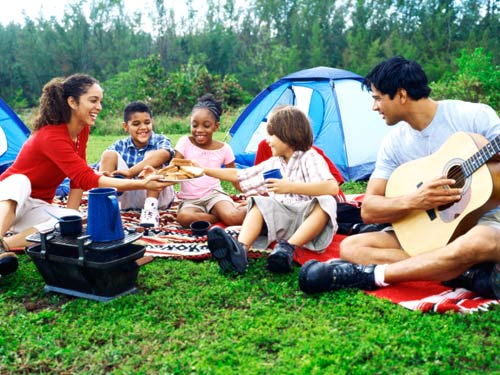Part II: Planning for Successful Summer Transitions
Summer is approaching, and that means plenty of transitions, including summer camps, travel plans, and out-of-town visitors. These experiences can be a welcome change from the daily rituals of the school year. For young children, however, this change can bring uncertainty, unpredictability, and unfamiliar people into their regular routines.
With some advanced preparation, parents can ease the challenges presented during these and other summer transitions. By thinking about the variety of potential reactions to change, parents can anticipate, prepare, and intervene in a positive way to ensure a more pleasant experience for everyone in the family.
Summer Camps
Choose carefully. The best camp for the child next door may not be the best camp for your child. Some children prefer structured camps, while others enjoy learning a variety of new activities. Some children prefer to be outdoors most of the time, while others crave inventing a robotics vehicle. Keep in mind that even if your child prefers the routines of his/her current preschool, the teaching staff may change over the summer. Come up with a separation plan for the first day of camp. Bring a familiar item from home, a photo of the family, and a special treat in the lunchbox. Visit the camp beforehand, if possible. This is also an opportunity for your child to learn some resiliency, bond with a new caregiver, cope with change, and try out something new.
Travel Plans
 Car trips, plane travel, and train adventures might provide excitement, anxiety, boredom, and the ongoing search for the nearest bathroom. Common challenges include motion sickness, picky eating or unhealthful food options, and the constant whine for entertainment. Once you get to your destination, there are additional challenges of sleeping in a new place, eating new foods, and acclimating to new surroundings. Some children thrive in this environment, while others will be very sensitive to these changes. If your child hasn’t done a long car trip, plan for regular rest stops for stretching, bring familiar food from home, and plan some car games, like Travel Bingo. Electronic items can add to motion sickness, so beware of relying solely on them for entertainment. For plane travel, parents might want to spend the afternoon at a local airport to watch the planes land and take off.
Car trips, plane travel, and train adventures might provide excitement, anxiety, boredom, and the ongoing search for the nearest bathroom. Common challenges include motion sickness, picky eating or unhealthful food options, and the constant whine for entertainment. Once you get to your destination, there are additional challenges of sleeping in a new place, eating new foods, and acclimating to new surroundings. Some children thrive in this environment, while others will be very sensitive to these changes. If your child hasn’t done a long car trip, plan for regular rest stops for stretching, bring familiar food from home, and plan some car games, like Travel Bingo. Electronic items can add to motion sickness, so beware of relying solely on them for entertainment. For plane travel, parents might want to spend the afternoon at a local airport to watch the planes land and take off.
Visitors
Summertime brings family and friends to your home for a visit. Think about where your visitors will sleep and how much disruption there will be to your child’s schedule and routine. If you need to move your child to another room, make the change in advance, so your child can begin to adjust before people arrive. Think about how you will squeeze in a few more people to your dining room table or if you’ll decide to have more picnics in the backyard. If you need to move some toys out of the family room, do so a few days in advance so your child can adjust. If you can, you might want to call or Skype family members or friends a few days before the visit so your child can reconnect before their arrival.
Summer transitions can be managed with some advanced planning and a thoughtful approach. Particularly if your child is spirited or sensitive, a proactive approach may help you avert the tantrum or meltdown brought about by unexpected change. Expect some disruptions to sleep, eating, and consistent potty use, knowing that your child will bounce back after returning to a more typical schedule and routine. Once you’ve anticipated some potential transition challenges and planned accordingly, you will be much more ready to enjoy your summer plans!



